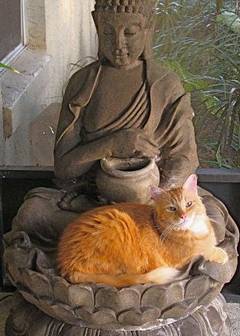 Nirvana is not a place, where one can expect facilities. We are deeply enmeshed in a world where materialistic postulations dominate, and it is not so facile to contravene the momentum of that paradigm. There is a way of checking through the answers of the old Zen Masters. You come to a recede with the desire to transform yourself.
Nirvana is not a place, where one can expect facilities. We are deeply enmeshed in a world where materialistic postulations dominate, and it is not so facile to contravene the momentum of that paradigm. There is a way of checking through the answers of the old Zen Masters. You come to a recede with the desire to transform yourself.
In respect to its social and moral code, the German philosopher, Prof. Max Muller has said, “The Zen Buddhist moral code taken by it is one of the most perfect which the world has ever known.” This is why you should not look for something here you can take home with you. In fact, as you get into ever-deeper levels, you may be aware of the movement of your mind in the previous level, even if you are not aware of the movement at the present level. These are the highest states that can be attained from the practice of worldly dharma. It is not natural to tighten your stomach muscles or to straighten your back by protruding your chest. It is doubtful whether anyone really achieves health that does not responsibly choose to be healthy.
A person who has experienced oneness is different from a mundane person. Just do not have any doubts about the method or whether you have the “right stuff” to practice.
Zen Koan: “If You Love, Love Openly” Parable
Twenty monks and one nun, who was named Eshun, were practicing meditation with a certain Zen master.
Eshun was very pretty even though her head was shaved and her dress plain. Several monks secretly fell in love with her. One of them wrote her a love letter, insisting upon a private meeting.
Eshun did not reply. The following day the master gave a lecture to the group, and when it was over, Eshun arose. Addressing the one who had written to her, she said: “If you really love me so much, come and embrace me now.”
Buddhist Insight on New Beginnings
All men have their fragilities and new beginnings. And when you look at how authoritative our habits are, and how much we go to sleep, and how much the world really needs somebody to have the audacity to say “no” or “stop” or “wake up” or “live differently,” it becomes very compelling. The phenomenal world is the supported destructible inhabitants, sentient beings, within the destructible environment. The British meditation teacher Christina Feldman writes in The Buddhist Path to Simplicity,
Cultivating the beginner’s mind involves a leap of faith, a willingness to dive deeply into “not knowing.” The alternative is to be chained to a past we know too well and to perpetuate history in each moment of our lives. In each new beginning we learn the art of letting things be. The concepts, images, assumptions, conclusions, and judgments; we let them be. They are received, listened to, and embraced in a vastness of heart that invests no absolute truth in them. It is a great challenge, undertaken only one moment at a time. Who is more free, the person who travels through their life carrying their raft upon their head, or the person who can lay it down and walk on unencumbered? The lessons of joy and sorrow, contraction and vastness, imprisonment and freedom are learned in each moment we are willing to begin anew and be changed by those lessons. They are simple and profound. To begin anew, to see anew, is to discover joy and freedom.